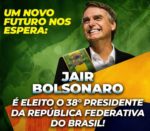The election of ultra-rightist Jair Bolsonaro today as president of Brazil practically completed the shift to the right recently begun in Latin America, a region in which the left was hegemonic a decade ago and in which Venezuela, Nicaragua, Cuba and Bolivia have been isolated.
The triumph of the far right, which received about 55.5% of the vote on Sunday compared to 44.5% achieved by the Socialist Fernando Haddad, clearly left the region leaning to the right because of the weight and influence of Brazil in South America , of which it represents practically half of both population and territory and GDP.
The appointment missed Fidel Castro (Cuba) and the only one that contrasted in the middle of the leftist elite was the Colombian Álvaro Uribe.
The turn of Latin America to the right began in November 2015 with the victory of Mauricio Macri in his dispute with the Justicialist Party of the then President Cristina Fernández.
In February of 2017 the Ecuadorians elected Lenín Moreno as president, who, despite being the godson of Rafael Correa, distanced himself from the policies of the leftist, with whom he broke up, allied himself to the right and even approached the United States.
In November of 2017, the victory of conservative Sebastián Piñera in Chile put an end to Bachelet’s leadership.
In February of this year Costa Rica opted for the official Carlos Alvarado and Honduras for the conservative Juan Orlando Hernandez.
The equally conservative Mario Abdo Benítez, son of the private secretary of the dictator Alfredo Stroessner, assumed the presidency of Paraguay in April and the Colombian Iván Duque, sponsored by the right-wing Álvaro Uribe, took over in August the head of state in the second most populated country in South America after winning in the second round the leftist Gustavo Petro.
Peru is governed since March by Martín Vizcarra, an independent politician with conservative ideas and who was chosen to conclude the term of the liberal businessman Pedro Pablo Kuczynski, dismissed by a corruption scandal.
According to analysts consulted by Efe, the conservative wave came to Latin America preceded by a serious economic crisis in several of its countries caused by the fall in the prices of raw materials, the main export guideline, and by corruption scandals involving several left rulers.
With the crisis, the support that the left governments had during the economic boom eroded.
In the new context, Venezuela was practically isolated and now it can suffer pressure from its two main neighbors.
“Bolsonaro can, as Ivan Duque did, leave Unasur (Union of South American Nations) for considering her the defender of Venezuela, and join Duque to press stronger measures against the Government of (Nicolás) Maduro,” the analyst told Efe. Andrea Hoffman, researcher at the Pontificia Universidad Católica.
Bolsonaro has in common with these presidents his choice for a clearly liberal economic policy, his strong speech against corruption and the support he received from evangelical groups, but is distinguished by its more radical positions, such as the defense of the military dictatorship that governed Brazil between 1964 and 1985 and its statements of sexist, racist and homophobic dye.
Despite this, his conservative neighbors began to approach the captain of the Army reserve even before his victory on Sunday, given the economic importance of Brazil for many of the countries in the region.
Bolsonaro, who promised to deepen Brazil’s relations with the countries of the region “free of dictatorships,” talked in the last week by telephone with Macri and Benítez, whose countries are highly dependent on the Brazilian economy.
He also received praise from Piñeira for his liberal ideas and met in Rio de Janeiro with senators from rightist parties that are part of the ruling coalition in Chile.




